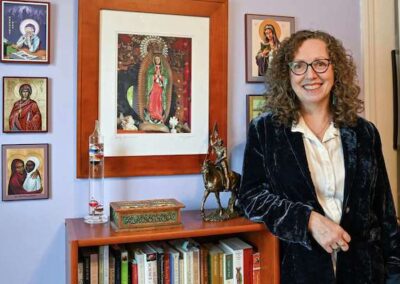Sorry for the long absence. I’ve got a couple of good excuses. It’s been a crazy week in the Not Strictly Spiritual household. The cats, of course, have added quite a bit of drama. Last night was the first night in a week that one or both of the cats did not wander around the house crying and jumping from dresser to dresser all night. So I guess that’s progress. Actually, Fred the Cat and Mirabella the Kitten are a sweet little pair. In just a few days, they have adapted to a house filled with noise and general craziness and to each other. Now it’s not uncommon to find Fred curled up with Mirabella, giving her little licks.
And then, on top of all that, there was work craziness as well. I taught a two-hour workshop on Wednesday for the Diocese of Albany’s annual Spring Enrichment program. My topic was “The Lost Generation: Reconnecting with Adult Catholics.” This is the fourth time I’ve presented this workshop, although never for two solid hours, and each time it’s different yet fascinating. It’s certainly a subject that gets people talking. How do we reach out to adult Catholics who feel cut off from their faith? How do we coax them back into the fold in unintimidating ways that will make them feel part of a faith community? There are no easy answers, but it absolutely has to begin with community first and catechesis second.
We can’t expect people to show up for classes or meetings if they don’t feel like they are part of something, if they have no stake in their parish or church. We have to give them ownership, welcome them, talk to them, answer their questions, and drop our preconceived notions about why they may or may not attend Mass, why they send their kids to faith formation but don’t practice the faith at home. As I say in my talk, if they have any connection to the church at all — no matter how tenuous — it’s a sign that they are within our grasp and may be hungry for something more. So many people who were born and raised Catholic feel isolated and abandoned today because they never really got the basics of their faith and because they feel like strangers in their own home. It’s time to find a way to heal those divisions and reach out to those who are searching for deeper meaning in this superficial world of ours.
I could go on and on about this, but for now I’ll just say that we need to begin first with the parents of all those children in faith formation programs. We need to reach the parents through the kids, educate the parents by involving them in the faith education of their children, connect with the parents not through mandatory meetings but through acts of solidarity and subtle, even hidden, catechesis. In other words, by making our faith real to them through our words and actions.
We are all living harried and overscheduled lives. We need to show people that their spiritual community can be a refuge in the midst of the chaos. But that means that parishes need to be truly welcoming, truly community-minded, truly open to new people and new ideas. It is no longer enough to simply pump children full of random Catholic facts and then send them on their way. It is time to incorporate families into the larger family of faith, to put those random facts into context so that people understand how all the individual threads of various teachings are woven together to form the beautiful tapestry that is the Catholic faith. We cannot demand discipleship. Instead we must extend an invitation that is so meaningful and so enticing that it simply cannot be refused.







